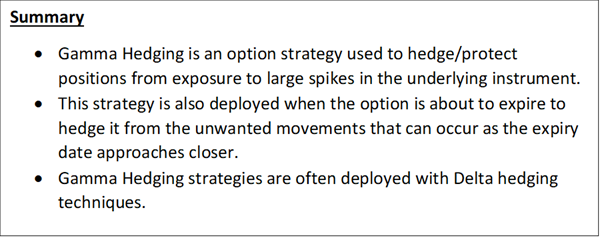Gamma Hedging
Updated on 2023-08-29T11:55:10.330885Z
What do you mean by Gamma Hedging?
Gamma hedging is an exchanging technique that attempts to keep a consistent delta in an options position, regularly delta-neutral, as the value of the underlying changes. It is utilised to diminish the danger made when the basic security takes solid up or down actions, especially during the last days before expiry.
An option position's gamma is the pace of progress in its delta for each 1-point move in the underlying instrument. Gamma is a significant proportion of the convexity of a derivative’s worth, comparable to the underlying asset. A delta hedge technique, in correlation, diminishes the impact of generally small basic value changes on the options price.

Understanding Gamma Hedging
A gamma neutral options position has been protected to significant moves in the underlying security. Accomplishing a gamma neutral position is a strategy for overseeing hazard in options trading by building up a portfolio whose delta's pace of progress is near zero, even as the basic ascents or falls. This is known as gamma hedging. A gamma-neutral portfolio is along these lines supported against second-order time value affectability.
Gamma hedging comprises adding extra alternative options contracts to a portfolio, ordinarily rather than the current position. For instance, an enormous number of calls were being stood firm on in a situation; a broker may add a bit put-alternative condition to balance a sudden drop in cost during the following 24 to 48 hours or sell a picked number of call choices at an alternate strike cost. Gamma hedging is a modern action that requires cautious estimation to be done accurately.
Gamma is the Greek-letter set propelled name of a standard variable from the Black-Scholes Model, the central equation perceived as a norm for valuing options. Inside this equation are two specific factors that assist brokers with understanding how option prices change according to the value moves of the underlying security: delta and gamma.
Delta tells a broker how much an options pricing is relied upon to change due to a bit of change in the fundamental stock or resource—explicitly a one-dollar difference in cost.
Gamma signifies the progress speed of an option’s delta, which refers to adjusting the cost of a fundamental stock or other resource's price. Gamma, as by definition, is the rate of change of the cost of an option. A few dealers additionally consider gamma the regular change coming about because of the second sequential one-dollar change in the underlying price. Adding gamma and delta to the first delta, you'd get the standard move from a two-dollar move in the underlying security.
Any financial backer who attempts to accomplish the delta-hedged position will make exchanges that have incredibly lower odds of significant spikes and forceful changes. In any case, note that even a delta supporting method can't offer the best or 100% assurance to the alternative purchasers. The explanation is fundamental. Just a modest quantity of time is left before the last expiration day. This implies that even some minor changes in the underlying asset price could bring about outrageous variances in the choice. That being said, delta-hedging probably won't do the trick in such circumstances. That is the point at which the gamma hedging is utilised related to delta hedging to shield the financial backer from the critical changes to the security.
Frequently Asked Questions
1) What is delta gamma hedging?
Delta-gamma hedging is an options technique that joins delta and gamma hedges to relieve the danger of changes in the underlying asset—and in the actual delta—as the fundamental resource moves. With delta supporting alone, a position has security from minor changes in the underlying. Massive changes will change the hedge (change the delta), leaving the position powerless. By adding a gamma hedge, the delta hedge stays unblemished.
Utilising a gamma hedge related to a delta hedge requires a financial backer to make new hedges when the underlying’s delta changes. The quantity of introductory offers purchased or sold under a delta-gamma hedge relies upon whether the underlying cost is expanding or diminishing and how much.
A broker is attempting to be delta-neutral or delta-hedged usually is making an exchange that has next to no change based on the short-term price volatility of a smaller magnitude. Such a trade implies that the trader is betting on volatility which means the stock price will trend in either direction. Yet, even delta hedging won't ensure an options dealer very well on the day preceding expiry. On this day, as there isn’t much time in expiry, the effect of even an ordinary price fluctuation in the fundamental security can cause extremely critical value changes in the option. Delta hedging is in this manner insufficient under these conditions.
Gamma hedging is added to a delta-hedging procedure to shield the dealer from more significant than anticipated changes to a security, or even a whole portfolio, regularly to shield from the impacts of quick value change in the option when the time value of the option mostly decayed.
2) What is the contrast between gamma hedging and delta hedging?
A primary delta hedge can be made by buying call choices and shorting a specific number of portions of the fundamental stock simultaneously. On the off chance that the stock's value stays as before, however, instability rises, the broker may benefit except if time value erodes all those benefits. A merchant could add a short call with an alternate strike cost to the technique to balance time value decay and secure against an enormous move in the delta; adding that second call to the position is a gamma hedge.
As the fundamental stock ascents and falls in value, a financial backer may purchase or sell partakes in the stock by chance that she wishes to keep the position neutral. This can build the position’s instability and costs. Delta and gamma hedging don't need to be neutral, and merchants may change how specific or negative gamma they are presented to after some time.